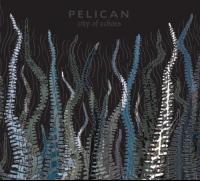Pelican was screwed after The Fire in Our Throats Will Beckon the Thaw. There was just no way to make such a fantastic followup to such a fantastic album. I might be alone in thinking this, but I have the feeling that other instrumetal/art-metal fans tend to agree. Or maybe they don't, and the album that is impossible to follow up was the eerily awesome Australasia. Either way, Pelican had some big shoes to re-fill.
It is always unfortunate when that happens to a band, because going in, after a conversation I had with bassist Bryan Herweg before the band entered the studio, I knew the new album wasn't going to be in the vein of either of the previous full-lengths. He wasn't lying. City of Echoes is the anti-Pelican; however, it does retain some of the band's trademark qualities.
For starters, no song pushes ten minutes. In fact, the songs are on average five minutes long. That may not seem like a big deal, but for a band that has made a career on incredibly long and drawn-out songs, it is a big change. City of Echoes picks up the pace for the most part, while still retaining many of the sludgy qualities that made the band's early material so appealing. It is an odd combination: the best of the old with a bit of the new. For the most part, it works out quite well.
The album opens with "Bliss in Concrete," a dreary little trip through an audio swamp. Pelican wastes no time with leading into tracks this time around, and after a minute of the same repeated riff, the sludgy metal blasts in, and the double-bass carries throughout most of the song. The riffs from guitarists Trevor de Brauw and Laurent Lebec lack the emotional buildup of previous efforts. Instead the duo comes as one of the heavier-hitting melodic onslaughts, barely matched by the much more metal-ier drumming of Larry Herweg.
"Spaceship Broken-Parts Needed" sounds more like a poor man's version of a cut from The Fire in Our Throats. It has the bi-polar dynamics of Pelican's older works, but also incorporates a much more diverse showing on the softer bits. If there is anywhere that Pelican has improved on this album, it is between the guitars on the softer bits. Instead of letting no sound be the best emotion, de Brauw and Lebec have thrown some technicality into the mix, giving even the softer parts a little metal seasoning. For a band that has been pegged into the bigger picture of the metal genre, it fits.
But Pelican is smart and doesn't let themselves become pigeonholed by the limitations of metal. "Winds with Hands" relies on a gorgeously recorded acoustic take that still showcases a barebones dynamic shift in tone. This unfortunately is semi-ruined by the unnecessary addition of an electronic howling towards the end, but the entire mood isn't lost. Other songs like "Far from Fields" would classify as metal for soccer moms. Sure, the fancy work on the frets are there, but the gleeful melodic sound suggests something far from metal, with the apex being a monster riff more often seen with Explosions in the Sky than Neurosis.
Overall, City of Echoes is a fantastic album. The problem is that Pelican has done better. Maybe I'm just spoiled on one of the best half-hours of music being only three songs, but the âshort' takes seem to be over before they've begun. The best parts of the songs fly right by without the buildup, and aside from "Far from Fields," many lack that master blow where the only way to survive is to head bang uncontrollably. At the same time, this isn't so much a band thing. Pelican has successfully avoided being pigeonholed as a mere Neurosis/Isis junkie with City of Echoes. It's an album that sees the band moving away from that tag where Pelican can only be said in the same sentence as Isis or Neurosis. Still, a step forward here and a step backward there makes for a great album.
